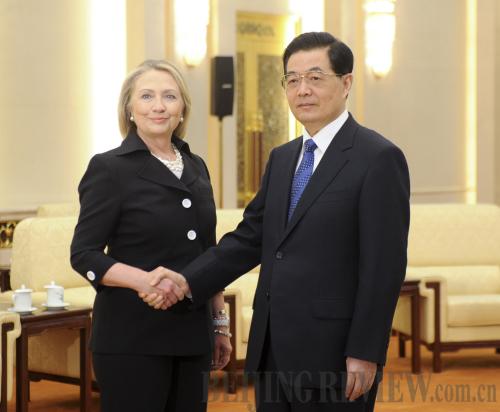|
 |
|
BUILDING TRUST: Chinese President Hu Jintao meets visiting U.S. Secretary of State Hillary Clinton in Beijing on September 5 ( ZHANG DUO) |
With Washington's high-tune claim of shifting the focus of its foreign policy toward the Asia-Pacific region, the quiet ocean is being stirred up. The growing tension is jeopardizing not only regional peace and stability, but also mutual trust between China and the United States.
Chinese observers have criticized the U.S. bias toward regional tension, stressing that the two sides must refocus on promoting mutual trust, so as to put the bilateral relationship back on the right track.
U.S. double standards
U.S. Secretary of State Hillary Clinton visited China on September 4 and 5 as part of an 11-day tour of Asia. This was likely to be Clinton's last visit to China as the U.S. secretary of state. She had paid seven visits to China previously—four visits for the China-U.S. Strategic and Economic Dialogue and another three for the High-Level Consultation on People-to-People Exchange.
Observers pointed out that the visit could be considered a farewell tour by the departing secretary of state. However, considering the escalating tension in Asia, especially the dispute over the Diaoyu Islands between China and Japan, it was more like a fire-fighting tour. They reckon the U.S. bias over territorial disputes is likely to encourage Japan's irrational actions regarding the Diaoyu Islands issue.
"Clinton's visit was definitely connected to the regional tension," Yu Wanli, an associate professor with the School of International Studies, Peking University, told Beijing Review. He explained that Clinton hoped to convince China to "restrain" itself over the Diaoyu Islands dispute, while trying to press China to accept a code of conduct in the South China Sea.
"Clinton set fire to the Diaoyu Islands issue as part of U.S. foreign policy turning its focus to the Asia Pacific, showing an obvious intention to contain China. Now the fire is so big that it is going to be out of U.S. control," Yu said.
According to Kyodo, an influential Japanese news agency, the Japanese Government has agreed on terms with the Kurihara family, which claims to own the Diaoyu Islands, to buy the islands on September 5. The report said the Central Government of Japan agreed to pay 2.05 billion yen ($26.15 million) for the "purchase" of part of the chain of islands in the East China Sea.
Yu recalled that the Diaoyu Islands issue essentially had been under control during the past decades. But the situation became tense in recent years, especially after the United States declared it was shifting the focus of its foreign policy toward the Asia Pacific. Yu said as Washington sticks to a principle of giving its allies priority, its Asia-Pacific policy has an obvious bias. Although the United States iterated it doesn't "take a position" on the dispute over the Diaoyu Islands, it has repeatedly claimed that the U.S.-Japan Security Treaty applies to the Diaoyu Islands.
Under the 1960 treaty, Washington will provide assistance to Tokyo when the territories under Japan's administration come under armed attack. Since the Diaoyu Islands are part of China's inherent territory, the Chinese Government has voiced opposition to U.S. statements that put the islands within the scope of the treaty.
Yang Xiyu, a senior research fellow with the China Institute of International Studies (CIIS), said U.S. tactics on the Diaoyu Islands reflected its ambivalence. Yang explained that, on the one hand, Washington wants to act with an image of a protector of Japan; on the other hand, it doesn't hope to pay an actual price for the protection. "The ideal status for the U.S. side is: The dispute over the Diaoyu Islands continues forever, but without the danger of escalating into a fight," Yang concluded.
| 